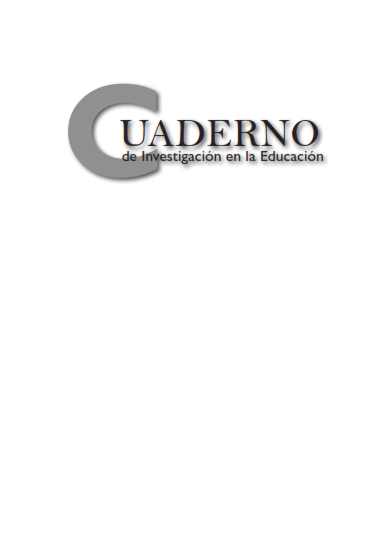Abstract
This article present research findings focusing on the teaching of literacy from a socio-cultural and critical perspectives in an elementary level classroom of a public school in Puerto Rico. The project delved into how to teach writing through the inclusion of popular culture and students‘ everyday literacies. As a model for the development of writing, curricular invitations were integrated to the process after the writing workshop had begun. The article discusses how integrating popular culture and students‘ everyday literacies contributed to the inclusion of all the students‘ voices and their active participation in the writing process. Curricular invitations as a writing strategy were especially important to include students who resisted writing and helped them perceive themselves as writers.
How to cite:
Costa, M. del R., Medina, C. L., & Soto, N. (2011). Abrir la puerta: La escritura a través de un lente diferente. Cuaderno de Investigación en la Educación, 26, 34-53. Retrieved from https://revistas.upr.edu/index.php/educacion/article/view/13316
References
Arthur, L. (2005). Popular culture. Views of parents and educators. En J. Marsh & J. Marsh (Eds.), Popular culture, new media and digi- tal literacy in early childhood (pp. 165-182). Londres: Routledge.
Atwell, N. (1998). In the middle: New understandings about writing, reading and learning (2da ed.). Portsmouth, NH: Heinemann Educational Books.
Bakhtin, M.M. (1993). Speech Genres, and other Late Essays (C. Emerson & M. Holquist, eds.). Austin, TX: University of Texas Press.
Barton, D. (2007). Literacy. An introduction to the ecology of written language. Massachusetts: Blackwell.
Barton, D., Hamilton, M., & Ivanic, R. (2000). Situated literacies: reading and writing in context. London: Routledge.
Cassany, D. (2006). Tras las líneas. Sobre la lectura contemporánea. Barcelona: Editorial Anagrama.
Cochran-Smith, M., & Lythe, S. (2009). Inquiry as stance: Practitioner research for the next generation. New York: Teachers College Press.
Departamento de Educación. (2007). Estándares de contenido y expectativas de grado, Programa de español. San Juan, PR: Departamento de Educación.
Erickson, F. (1986). Qualitative methods in research on teaching. En M. Wittrock, The Handbook of research on teaching. New York: MacMillan.
Gee, J. (1989). Literacy, discourse and linguistic: Introduction. Journal of Education, 171(1), 5-17.
Graves, D. (1983). Writing: Teachers and children at work. Portsmouth, NH: Heinemann Educational Books.
Harste, J., Short, K. & Burke, C. (1995). Creating classrooms for authors and inquirers. Portsmouth, NH: Heinemann Educational Books.
Janks, H. (2009). Literacy and power. New York: Routledge.
Luke, A. & Freebody, P. (1999). Further notes on the four resource model. Recuperado de Reading on line, http://www.readingonline. org/research/lukefreebody.html
Medina, C. & Costa, M del R. (2010). Collaborative voices exploring culturally and socially responsive pedagogy in teacher preparation. Language Arts, 87(4), 263-276.
Merino Obregón, R. & Quichiz Campos, G. (2010, 20 de julio). Perspectiva de la literacidad como práctica social. Recuperado de Blog PUCP, http://blog.pucp.edu.pe/media/229/20100720-Literacidad%20como%20practica%20social.pdf
Newkirk, T. (2009). Holding on to good ideas in a time of bad ones. Six literacy principles worth fighting for. Portsmouth, NH: Heinemann Educational Books.
Newkirk, T. (2002). Misreading masculinity: Boys, literacy and popular culture. Portsmouth, NH: Heinemann Educational Books.
Pahl, K. & Rosswell, J. (2010). Artifactual Literacies: Every object tells a story. New York: Teachers College Press.
Routman, R. (1995). Donald Graves: Outstanding educator in the language arts. Language Arts, 72(7), 518-525.
Strauss, A., & Corbin, J. (1990). Basics of qualitative research: Grounded theory procedures and techniques. Londres: Sage.
Street, B. V. (1984). Literacy in theory and practice. Cambridge: Cambridge University Press.
Van Sluys, K. (2005). What if and why?: Literacy invitations for a multicultural classroom. Portsmouth, NH: Heinemann Educational Books.
Xu, S. H., Perkins, R. & Zunich, L. (2005). Trading cards to comic strips. Popular culture texts and literacy learning in grades K-8. Newark, Del.: International Reading Association.
The contents published in the Puerto Rico Journal of Education is freely distributed under open access practices, in accordance with the Creative Commons license, Attribution-NonCommercial 4.0 International (CC BY-NC 4.0). Through these principles, the journal and its authors allow readers to access, reproduce and share articles in full text. Users should give credit to authors in a reasonable way without suggesting they have their support. Under no circumstances, readers may make use of the contents for commercial purposes. The authors retain copyright on their works.

